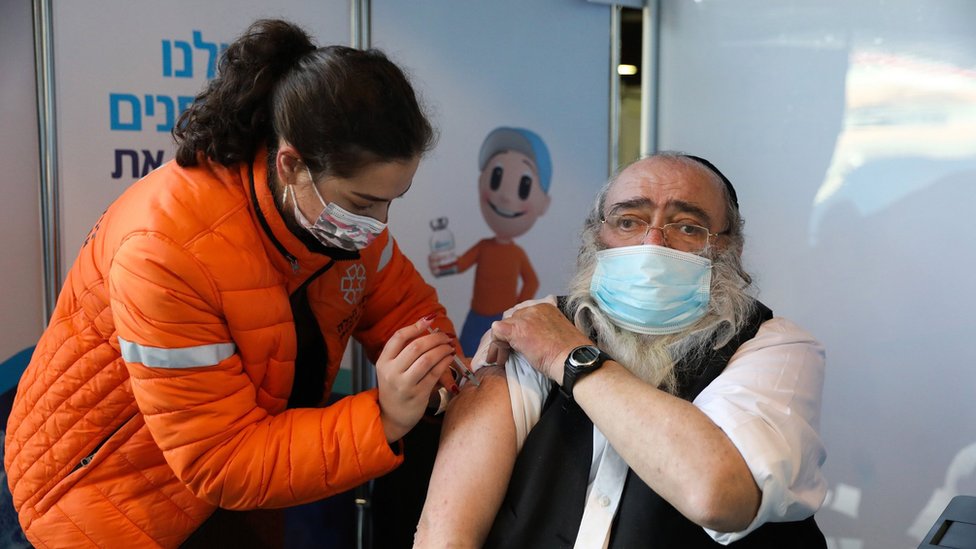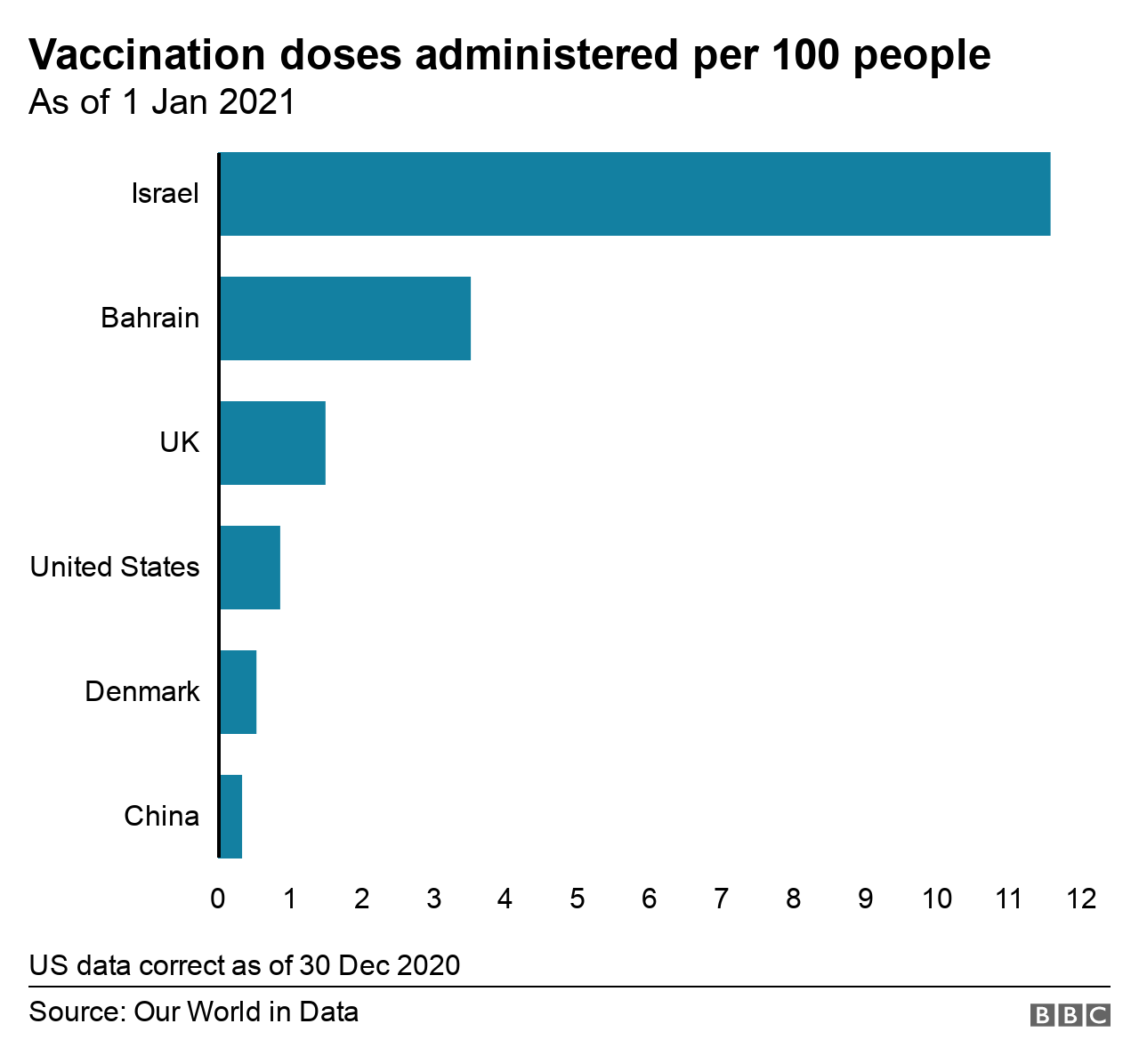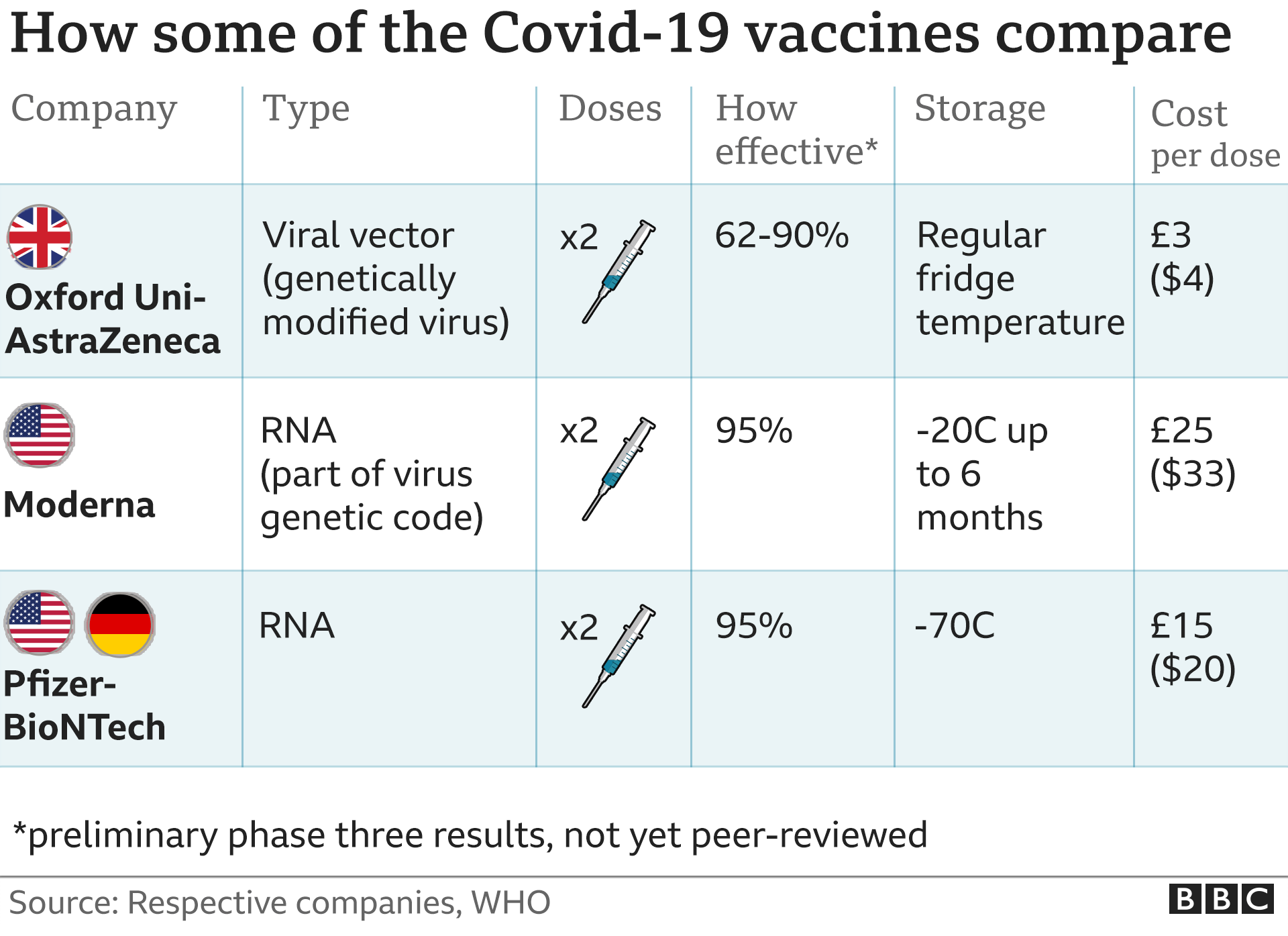- Joined
- Mar 31, 2020
- Messages
- 9,153
- Points
- 113
bbc.com
Coronavirus: Israel leads vaccine race with 12% given jab
 image copyrightEPA
image copyrightEPA
image captionIsrael has given priority to the over-60s in its vaccination campaign
Israel has given vaccinations against coronavirus to more than one million people, the highest rate in the world, as global immunisation efforts step up.
Israel has a rate of 11.55 vaccination doses per 100 people, followed by Bahrain at 3.49 and the UK at 1.47, according to a global tracking website affiliated with Oxford University.
In comparison, France had vaccinated 138 people in total by 30 December.
More than 1.8m people have now died of the virus around the world.
The comparative figures on vaccination are put together by Our World in Data, which is a collaboration between Oxford University and an educational charity.
They measure the number of people who have received a first dose of the coronavirus vaccine. Most of the vaccines approved for use so far rely on two doses, given more than a week apart.

The US fell far short of its target of vaccinating 20 million people by the end of 2020, with just 2.78 million having received a jab by 30 December.
Meanwhile, the US government's top infectious diseases expert, Dr Anthony Fauci, has said he does not agree with UK plans to give as many people as possible a first vaccine dose, while delaying second doses.
India has meanwhile approved two vaccines for emergency use - the Oxford-AstraZeneca vaccine and the Covaxin vaccine, developed locally by Bharat Biotech and the state-run Indian Council of Medical Research.
Two further vaccines are awaiting approval. The country aims to vaccinate 300 million people by the middle of the year and has been staging drills to prepare for mass distribution.
How has Israel got so far ahead?
Israel began vaccinations on 19 December and is delivering jabs to about 150,000 people a day, with priority given to the over-60s, health workers and people who are clinically vulnerable.
It secured supplies of the Pfizer-BioNTech vaccine following negotiations early on in the pandemic. It is contacting people with priority access to the vaccine through its health care system - by law all Israelis must register with a recognised health care provider.
Israel has safely subdivided shipments of the Pfizer vaccine, which must be stored at -70C, Health Minister Yuli Edelstein told YNet TV news. This means smaller batches of the vaccine can be sent out to remote communities.
Prime Minister Benjamin Netanyahu, who is campaigning for re-election, has predicted Israel could emerge from the pandemic as early as February. It is currently in its third national lockdown.
media captionHow will the new Pfizer vaccine work?
Why is France lagging behind?
In the first three days of its vaccination campaign, which launched on 27 December, France inoculated fewer than 100 people. In comparison, Germany had given more than 190,000 vaccines by Saturday.
The EU was slower than the UK or US to authorise any of the vaccines. The European Medicines Agency, the regulator for the 27 EU member states, gave its approval for the Pfizer vaccine on 21 December, compared to 2 December in the UK and 11 December in the US.
Part of the difficulty in France stems from the widespread scepticism about the vaccination. In a 15-country poll carried out by Ipsos Global Advisor, just 40% of French respondents said they would be willing to have the vaccine.
This compares to 80% in China, 77% in the UK, and 69% in the US.
Earlier this week, the French health minister defended the slow pace of vaccinations, saying authorities had chosen to give the jab in care homes to elderly residents, rather than making them travel.
However, on Thursday French President Emmanuel Macron struck a more urgent tone, saying: "I will not allow an unjustified slowness to set in without good reason."
India is holding a national drill for its vaccination programme, which is aiming to reach 300 million people by the middle of the year.
It will rely on the Oxford-AstraZeneca vaccine, which has now been recommended by a government panel. The Oxford jab does not require the same storage at extremely low temperatures as the Pfizer vaccine, making it suitable for distribution to areas without sophisticated health care facilities.
The Oxford-AstraZeneca vaccine is known as Covishield in India, where it is being manufactured by the Serum Institute of India. Another vaccine, developed by Bharat Biotech, has been approved for emergency use.
Covid-19 has already claimed nearly 150,000 lives in India, with about 10 million people infected - second only to the number infected in the US.

Coronavirus: Israel leads vaccine race with 12% given jab

image captionIsrael has given priority to the over-60s in its vaccination campaign
Israel has given vaccinations against coronavirus to more than one million people, the highest rate in the world, as global immunisation efforts step up.
Israel has a rate of 11.55 vaccination doses per 100 people, followed by Bahrain at 3.49 and the UK at 1.47, according to a global tracking website affiliated with Oxford University.
In comparison, France had vaccinated 138 people in total by 30 December.
More than 1.8m people have now died of the virus around the world.
The comparative figures on vaccination are put together by Our World in Data, which is a collaboration between Oxford University and an educational charity.
They measure the number of people who have received a first dose of the coronavirus vaccine. Most of the vaccines approved for use so far rely on two doses, given more than a week apart.

The US fell far short of its target of vaccinating 20 million people by the end of 2020, with just 2.78 million having received a jab by 30 December.
Meanwhile, the US government's top infectious diseases expert, Dr Anthony Fauci, has said he does not agree with UK plans to give as many people as possible a first vaccine dose, while delaying second doses.
- The Oxford vaccine story
- How close is the light at the end of the Covid tunnel?
- India plans to 'begin Covid vaccination in January'
India has meanwhile approved two vaccines for emergency use - the Oxford-AstraZeneca vaccine and the Covaxin vaccine, developed locally by Bharat Biotech and the state-run Indian Council of Medical Research.
Two further vaccines are awaiting approval. The country aims to vaccinate 300 million people by the middle of the year and has been staging drills to prepare for mass distribution.
How has Israel got so far ahead?
Israel began vaccinations on 19 December and is delivering jabs to about 150,000 people a day, with priority given to the over-60s, health workers and people who are clinically vulnerable.
It secured supplies of the Pfizer-BioNTech vaccine following negotiations early on in the pandemic. It is contacting people with priority access to the vaccine through its health care system - by law all Israelis must register with a recognised health care provider.
Israel has safely subdivided shipments of the Pfizer vaccine, which must be stored at -70C, Health Minister Yuli Edelstein told YNet TV news. This means smaller batches of the vaccine can be sent out to remote communities.
Prime Minister Benjamin Netanyahu, who is campaigning for re-election, has predicted Israel could emerge from the pandemic as early as February. It is currently in its third national lockdown.
media captionHow will the new Pfizer vaccine work?
Why is France lagging behind?
In the first three days of its vaccination campaign, which launched on 27 December, France inoculated fewer than 100 people. In comparison, Germany had given more than 190,000 vaccines by Saturday.
The EU was slower than the UK or US to authorise any of the vaccines. The European Medicines Agency, the regulator for the 27 EU member states, gave its approval for the Pfizer vaccine on 21 December, compared to 2 December in the UK and 11 December in the US.
Part of the difficulty in France stems from the widespread scepticism about the vaccination. In a 15-country poll carried out by Ipsos Global Advisor, just 40% of French respondents said they would be willing to have the vaccine.
This compares to 80% in China, 77% in the UK, and 69% in the US.
Earlier this week, the French health minister defended the slow pace of vaccinations, saying authorities had chosen to give the jab in care homes to elderly residents, rather than making them travel.
However, on Thursday French President Emmanuel Macron struck a more urgent tone, saying: "I will not allow an unjustified slowness to set in without good reason."
India is holding a national drill for its vaccination programme, which is aiming to reach 300 million people by the middle of the year.
It will rely on the Oxford-AstraZeneca vaccine, which has now been recommended by a government panel. The Oxford jab does not require the same storage at extremely low temperatures as the Pfizer vaccine, making it suitable for distribution to areas without sophisticated health care facilities.
The Oxford-AstraZeneca vaccine is known as Covishield in India, where it is being manufactured by the Serum Institute of India. Another vaccine, developed by Bharat Biotech, has been approved for emergency use.
Covid-19 has already claimed nearly 150,000 lives in India, with about 10 million people infected - second only to the number infected in the US.

- Covid: How close is the light at the end of the tunnel?
Published14 December 2020
